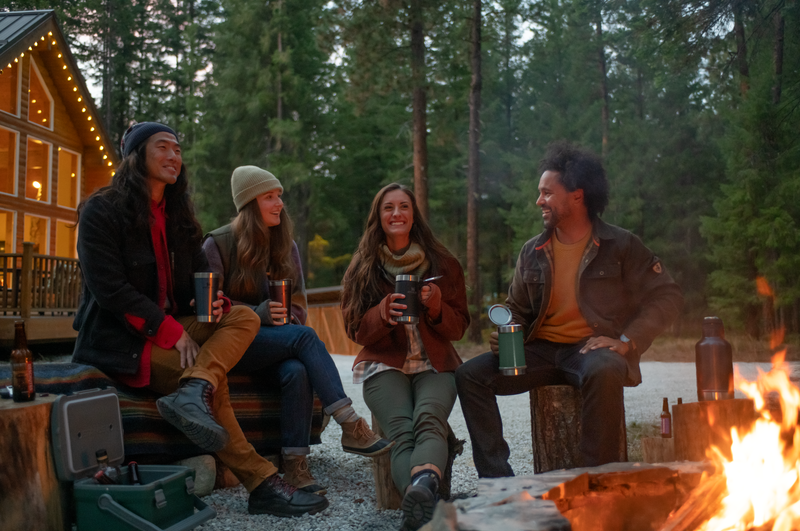Studies and research over the last century on human-nature relationships show that spending time in nature can benefit a person’s physical health, mental health, and even social health. In addition to the personal benefit of the human-nature relationship, humans may foster greater care for environmental initiatives that seek to protect natural places and resources to preserve them for future use.
How Humans Can Positively Impact the Environment
A connection with nature is associated with pro-environmental behaviors as well as personal health and wellbeing. Studies on types of nature contact, such as visiting or spending time in nature once-a-week, were positively associated with overall health. Contact with nature also influences pro-environmental household behaviors that may include:- Reusing items to reduce plastic waste.
- Making sustainable purchases for gear and items that can be reused.
- Increased recycling.
- Participating in greener transportation.
Additionally, people who watched or listened to nature documentaries reported higher levels of pro-environmental behaviors.
Research on pro-environmental behavior and neighborhood nature shows that there are positive associations between pro-environmental behaviors and neighborhood greenspaces that were present in households on both ends of the socioeconomic spectrum. This research indicates that improving access and contact with nature through urban planning could be a viable approach to meet vital sustainability targets that seek to protect global ecosystems and maintain planetary life-support systems.
How Nature Can Positively Impact Human Health
A large body of research that has been conducted over the last century reinforces connections between nature and human health. Amongst these studies, the term biopilia — meaning “love of nature” was — coined to describe how humans are hard-wired evolution to feel an emotional tie to other living organisms such as plants and animals. Spending time in nature or around natural spaces such as neighborhood parks and green spaces has shown positive impacts on physical health as well as mental and emotional health. These positive effects may, in turn, promote the desire to protect and preserve natural environments for future use.
Physical Health
Physical health benefits from spending time in nature may include:
-
Benefits specific to outdoor exercise. Exercising outdoors is associated with greater feelings of revitalization, increased energy and engagement, and decreases in tension, confusion, anger, or depression.
-
Lowered blood pressure. Studies have shown that immersion in nature can lower blood pressure by reducing stress-related hormones cortisol and adrenaline. Sun exposure can also lower blood pressure and reduce the risk of heart attack and stroke by dilating blood vessels.
-
Immune system support. Studies on nature and the immune system show that the many psychological benefits of spending time in nature may play a role in supporting the immune system. Exposure to nature may help the body to a state of “rest and digest,” the opposite of the “fight or flight” mode. The feelings of uplifted mood, or feeling calm can help to relax the body, instigating a reallocation of bodily resources to support the immune system.
-
Improved sleep. Spending time outdoors may improve sleep by helping to regulate a person’s internal circadian rhythm. Nature may also improve sleep quality by increased physical activity and bringing about lowered feelings of depression.
-
Improved recovery. Studies on patients in a hospital setting show that the ability to view nature through a window after surgery reduced the length of the hospital stay, improved patient’s mood, and reduced the need for analgesic doses, or lowered their need for stronger pain medications. Hospital gardens may help patients heal by reducing anger, anxiety, and pain, blood pressure, and muscle tension and improving relaxation.
-
Reduced allergy sensitivity. Studies show that the great outdoors is good for allergies. Contact with nature and the biodiversity of the natural environment largely affects the development of the immune system. The bodies of those that regularly encountered allergens such as microbes, mold, and plant material were more adept at recognizing and responding to allergens in what is called the farm effect.
Mental Health
Mental and emotional health benefits of spending time in nature may include:
- Reduced stress. Research shows that spending time in nature reduces stress. The study by Cornell University found that as little as ten minutes in a natural setting helped participants feel happier and lessen the effects of both physical and mental stress.
- Elevated mood and lowered depression. A study on how natural experiences may affect the mind showed that participants in the study showed improved mental wellbeing. Participants of the study engaged in 90-minute walks in either rural or urban environments. Those who participated that walked in natural environments reported a decrease in rumination — repetitive thoughts focused on negative aspects of the self, decreased feelings of depression, and reduced neural activity in the area of the brain linked to risk for mental illness. Time in nature can also be an important part of wilderness therapy for military veterans.
- Increased short term memory. A study by the University of Michigan found that nature walks can improve short-term memory. The results found that the types of attention used by a person were directly impacted by their environment. People in natural environments may utilize direct attention which may produce a more restorative effect on the mind.
- Improved vision. Natural daylight may benefit eyesight by reducing the risk of developing myopia, commonly known as nearsightedness. Dopamine is released by the stimulus of bright outdoor light, helping the eye to maintain a healthy shape. Electronic screens may also pose a risk to vision, so taking time to enjoy a natural environment without screens may also have positive implications for computer vision syndrome.
- Greater creativity. Studies on the impact of nature on creativity show that nature can enhance creative ways of thinking, especially in the preparation phase and the incubation phase of the creative process.
- Increased sense of spirituality. Spending time in nature can benefit spirituality and wellbeing. The often reported feelings of restoration, healing, and spirituality from those that have experienced nature may help people to embrace the journey of self-discovery and help to create a feeling of connectedness, shared purpose, rhythm, and balance.
How to Spend More Time Outdoors
There are many ways to enjoy time outdoors and in natural environments. Though some may enjoy excursions to the wilderness, others might enjoy easy access such as a walk in urban green spaces. The health benefits from nature depend on the dose, preference, preservation, and inclusion of green and natural spaces for the future.
A few ideas and option to enjoy the benefits of nature may include:
- Take your insulated and reusable coffee mug to enjoy your beverage outside in the morning, afternoon, or on a work break.
-
Choose to eat a meal outside.
-
Go on a walk around your neighborhood or explore a local park.
-
Invite your friends to happy hour or drinks outside, or go on a hike with a reusable growler or flask.
-
Pack up the car and take a car camping trip.
-
Go on a backpacking trip.
-
Exercise outdoors rather than at the gym.
-
Participate on a community team for an outdoor sport.
-
Try a new outdoor sport like hiking, biking, fishing, rock climbing, outdoor yoga or tai chi, or a snow sport such as snowshoeing, skiing, or snowmobiling.
-
Plan a family or friend camping trip.
-
Learn a new hobby such as birdwatching, identifying native plants, or landscape photography.
-
Grow a garden.
-
Walk or ride a bike as alternative transportation.
-
Go outside and watch the sunrise or sunset.
-
Swim or float in a river or lake.
-
Visit the ocean.
-
Start a nature journal.
-
Have a picnic.
With any outdoor activity, remember to put safety first, so that you can keep yourself and your environment healthy.
Back to HOW-TO GUIDES




